Chihuahuas are among the most beloved dog breeds in the world, known for their small size, big personalities, and loyal companionship. If you’re considering adopting one of these charming little dogs or you’re simply curious about them, you might be asking, “How many types of Chihuahuas are there?” Surprisingly, there are several different types of Chihuahua breeds, each with unique characteristics and traits. In this blog post, we’ll explore the various Chihuahua types to help you better understand these delightful dogs.
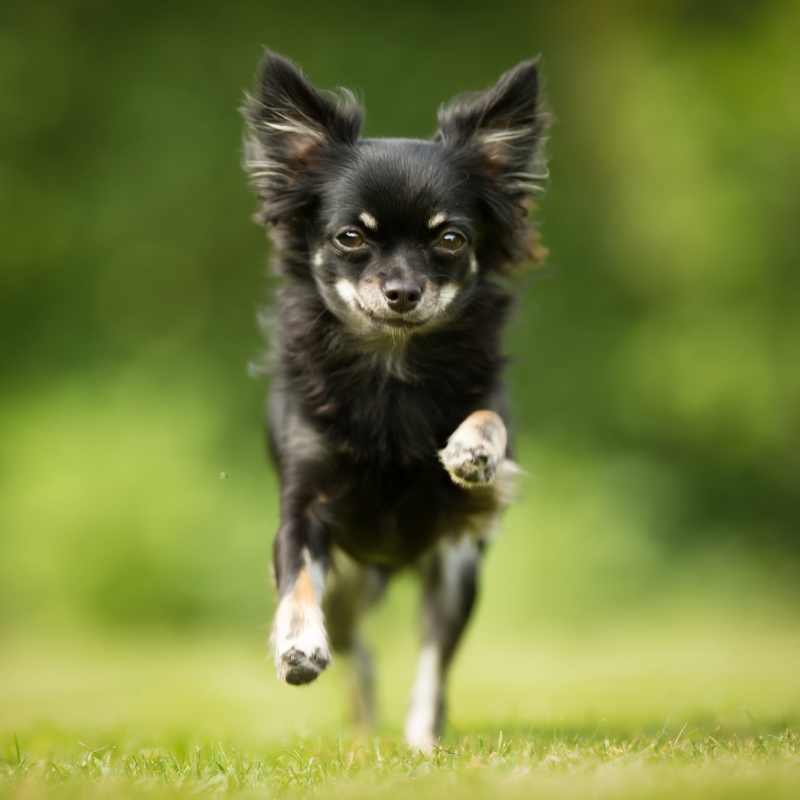
What Defines a Chihuahua?
Before diving into the different types of Chihuahuas, it’s essential to understand what defines a Chihuahua. This breed is recognized for its small stature, often weighing between 2 to 6 pounds and standing around 5 to 8 inches in height. Despite their tiny size, Chihuahuas have a confident, sometimes even sassy, demeanor that makes them excellent companions. Their origins trace back to Mexico, and they are named after the Mexican state of Chihuahua. Known for their long life expectancy, Chihuahuas can often live up to 15 to 20 years with proper care.
Chihuahuas are considered a symbol of loyalty and have a rich history that dates back to ancient times. They were often kept by the Aztecs as mighty companions and were even thought to have spiritual significance. This ancient heritage adds to their appealing nature and has created a special bond with their human companions over centuries.
The American Kennel Club (AKC), which is a leading canine organization, recognizes two main varieties of Chihuahuas based on their fur: Long-Haired and Smooth-Coat. However, other classifications based on head shape, size, and color exist, making the Chihuahua one of the most versatile dog breeds. Now, let’s explore the various types of Chihuahua dogs you might encounter.
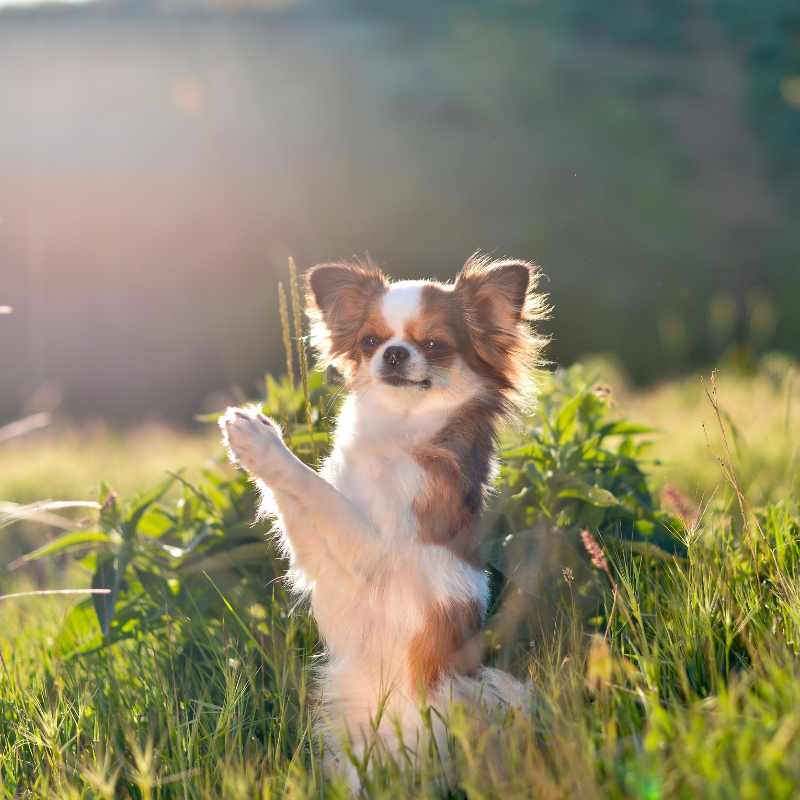
Chihuahua Types That You Need To Know
1. Long-Haired Chihuahuas
One of the most well-known types of Chihuahuas is the Long-Haired Chihuahua. As the name suggests, these dogs have longer hair, which is soft and can be either straight or slightly wavy. The long hair gives them a fluffy appearance, especially around the ears, neck, and tail. Long-Haired Chihuahuas often require regular brushing to keep their coats looking neat and to prevent matting.
Despite their glamorous looks, they don’t shed as much as you might expect, making them a popular choice for people who prefer a dog with a manageable grooming routine. Visiting a professional groomer on a weekly basis can help avoid tangles and keep their coat in great condition. Long-Haired Chihuahuas are also known for their sweet temperament and are generally affectionate and loving companions. Owners should also consider investing in a good-quality brush to keep the coat shiny and healthy.
2. Smooth-Coat Chihuahuas
The Smooth-Coat Chihuahua, sometimes referred to as the Short-Haired Chihuahua, is the other primary type of Chihuahua based on coat length. These dogs have a short, smooth coat that lies close to the bodies, giving them a sleek and shiny appearance. Unlike their long-haired counterparts, Smooth-Coat Chihuahuas require less grooming and are a good choice for those who want a low-maintenance pet.
These Chihuahuas are known for their energetic and lively personalities. They are just as affectionate as Long-Haired Chihuahuas and make excellent companions for those who enjoy an active lifestyle. Their alert nature makes them great watchdogs, although they may have a tendency to bark frequently. Regular walking and exercise help these dogs burn off excess energy and stay happy.
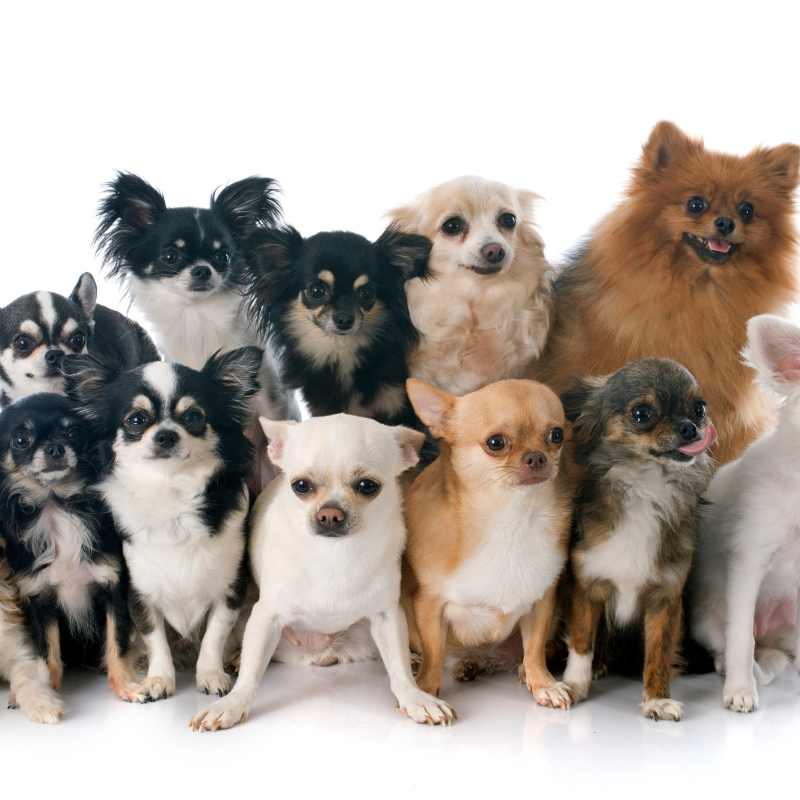
3. Apple Head Chihuahuas
Apple Head Chihuahuas are one of the most recognizable types of Chihuahuas due to their distinct head shape. They have a rounded skull that resembles an apple, hence the name. This head shape is often accompanied by large, expressive eyes and a short nose, giving the Apple Head Chihuahua a charming and slightly baby-like appearance. Apple-headed Chihuahuas have a distinct stop where the muzzle meets the forehead, creating a round profile.
This type of Chihuahua is the most common and is often the official standard for the breed in dog shows. Apple Head Chihuahuas tend to have a more prominent forehead and a noticeable stop, which is the angle where the muzzle meets the forehead. They are known for their affectionate nature and strong bonds with their owners, making them popular pets for families and individuals alike.
4. Deer Head Chihuahuas
Another type of Chihuahua that stands out is the Deer Head Chihuahua. As the name implies, these Chihuahuas have a head shape resembling that of a young deer, with a more elongated head, a less pronounced stop, and a longer muzzle. Deer Head Chihuahuas also typically have larger ears and a more slender build compared to the Apple Head variety.
Although Deer Head Chihuahuas are not as common in dog shows, they are popular among pet owners due to their distinctive look and friendly personality. They often have a slightly larger frame than Apple Heads but still maintain the small size characteristic of the breed. Deer Head Chihuahuas are usually more energetic and may require more exercise to stay fit and healthy.
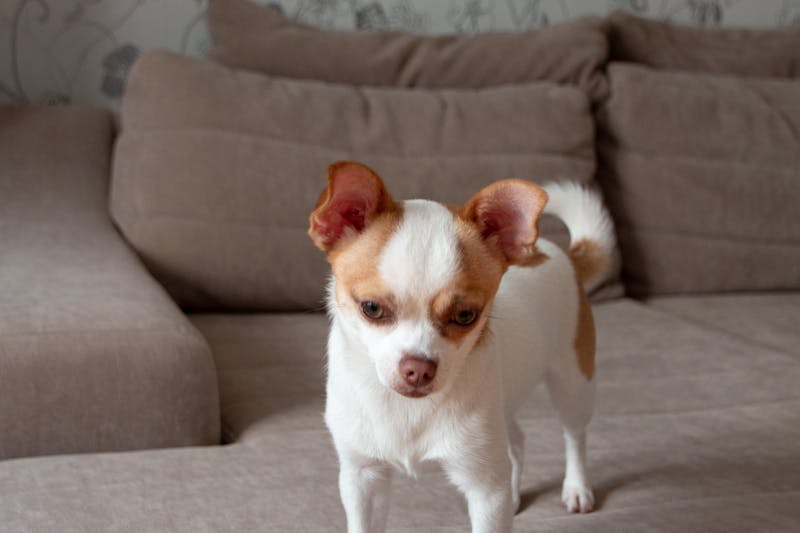
5. Teacup Chihuahuas
Teacup Chihuahuas are not an officially recognized type of Chihuahua by major dog breed registries, but they are highly sought after due to their incredibly small size. These tiny dogs weight less than 4 pounds and are often small enough to fit in the palm of your hand, hence the name “teacup.” Despite their miniature size, they have all the personality traits of a standard Chihuahua, including their boldness and loyalty.
It’s important to note that while Teacup Chihuahuas are adorable, they can have health issues related to their size, such as a higher risk of injury, dental problems, and a shorter lifespan. Prospective owners should be prepared to provide extra care and attention to ensure their Teacup Chihuahua’s health and well-being. Regular visits to the vet and proper food tailored to their size can help maintain their health. Teacup Chihuahuas are also more prone to disease like hydrocephalus, a condition where fluid builds up in the brain.
6. Fawn Chihuahuas
Fawn Chihuahuas are named not for their head shape or coat length, but for their color. “Fawn” refers to a light brown or tan color that is quite common among Chihuahuas. This color can vary in shade, from a pale cream to a deep red-brown. Both Long-Haired and Smooth-Coat Chihuahuas can come in fawn color.
The fawn color is often seen in Apple Head and Deer Head varieties, making it one of the most versatile types of Chihuahua breeds. Fawn Chihuahuas are admired for their beautiful coat color and can have other markings, such as white or black accents.
7. Merle Chihuahuas
Merle Chihuahuas have a distinctive coat pattern that includes patches of color mixed with lighter shades, giving them a speckled or mottled appearance. The Merle gene can affect the coat color as well as eye color, often resulting in striking blue eyes. Both Long-Haired and Smooth-Coat Chihuahuas can carry the Merle pattern.
While Merle Chihuahuas are beautiful, it’s essential to approach breeding them with caution, as the Merle gene can sometimes be associated with health problems such as hearing and vision impairments. Responsible breeders often conduct DNA testing to ensure the health and well-being of Merle Chihuahuas. Regular health screening is recommended to detect issues early.
Merle Chihuahuas are known for their appealing look, but they can be prone to certain genetic conditions. Regular vet visits and proper nutrition are essential for maintaining their health.
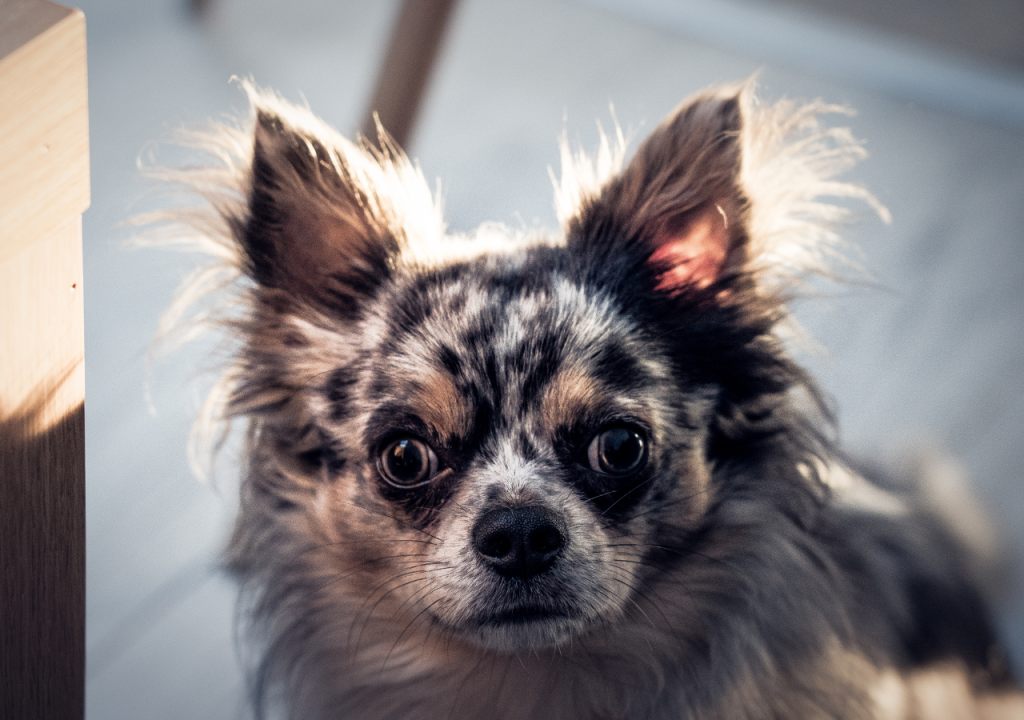
8. Chihuahua Mixes
In addition to the purebred types, there are also several Chihuahua mixes, which result from crossing a Chihuahua with another breed. One popular example is the Chorkie, a cross between a Chihuahua and a Yorkshire Terrier. These mixed-breed dogs can inherit traits from both parent breeds, resulting in unique combinations of personality and appearance.
These mixes can be a great option for those looking for a Chihuahua with a twist, as they often combine the best traits of both breeds. Mixed-breed Chihuahuas can also be found in shelters, offering a chance to adopt a pup that needs a loving home. When choosing a Chihuahua mix, it’s important to consider the traits of both parents and how they might influence the puppy’s personality and health.
Caring for Your Chihuahua
No matter which type of Chihuahua you choose, caring for them involves understanding their needs. Regular brushing is necessary for Long-Haired Chihuahuas, while Smooth-Coat Chihuahuas benefit from less frequent grooming. Providing a warm environment, easy access to fresh water, and a balanced diet can help ensure your Chihuahua thrives. Monitoring their weight and life expectancy is crucial, especially for smaller types like Teacup Chihuahuas, who may face more health challenges.
Chihuahuas are intelligent and enjoy fun activities like playing with treats, engaging in obedience training, and going for walks. Despite their size, they can be very alert and protective, making them excellent watchdogs. They are known to form strong bonds with their owners and love to cuddle. Many owners find that their Chihuahuas enjoy sitting on the couch, comfortable and safe with their human companions.
Chihuahuas have delicate bones, especially in their legs, so care must be taken to prevent injury. They also may have dental issues, so brushing their teeth and providing dental treats is recommended. Some owners even consider regular check-ups with a vet specializing in small breeds to help keep their pups healthy.
Nutrition plays a vital role in a Chihuahua’s health. A diet rich in protein, with the appropriate amount of vitamins and minerals, will keep them active and happy. You can consult your vet for recommendations on the best food options tailored to your Chihuahua’s specific needs. Including CBD treats in their diet has been reported by some owners to help with anxiety and joint health.
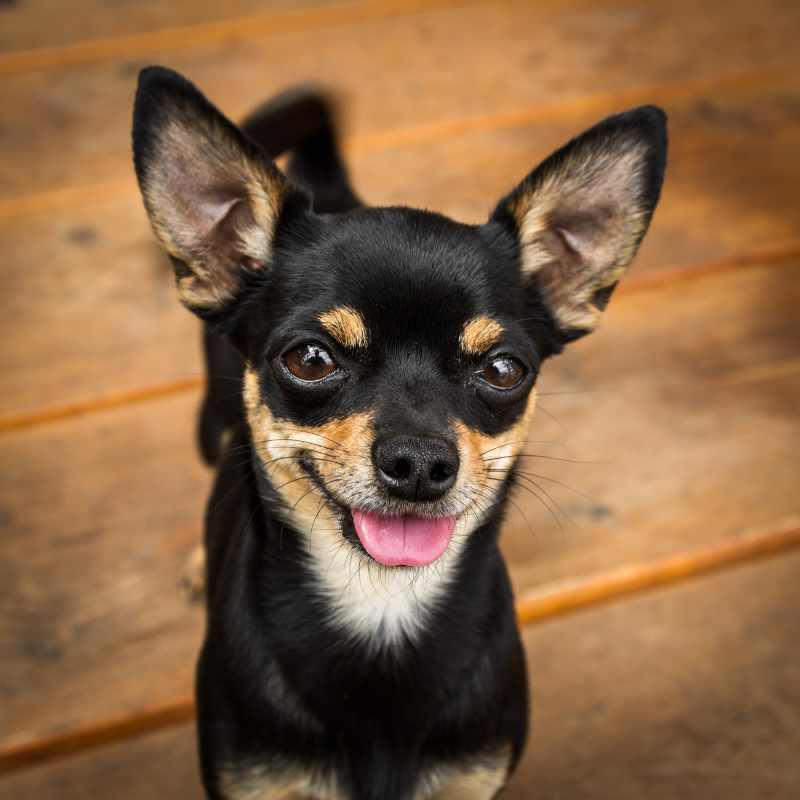
Common Health Concerns
Chihuahuas, due to their small size and genetic background, can be prone to certain health issues. One of the more common concerns is hydrocephalus, a condition that involves fluid accumulation in the brain, which can cause swelling and discomfort. Regular vet check-ups are crucial for early detection and management of such conditions.
Joint issues like patellar luxation (dislocation of the kneecap) are also something to watch for in Chihuahuas. Keeping your Chihuahua at a healthy weight and avoiding strenuous activities that could harm their joints is important. Regular exercise, a healthy diet, and monitoring their physical condition can support their overall health.
How to Train a Chihuahua
Training a Chihuahua can be both a fun and rewarding experience. These dogs are highly intelligent and eager to learn. Starting training from a young age is ideal, as puppies are more adaptable and open to new experiences. Basic obedience training, including commands like sit, stay, and come, should be taught early. Positive reinforcement techniques, such as using treats and praise, are effective with Chihuahuas. Consistency is key, as Chihuahuas can sometimes be stubborn.
Socialization is also a crucial part of training. Exposing your Chihuahua to different people, dogs, and environments can help prevent fearfulness and aggression. Regularly taking them to parks or dog-friendly areas will provide them with the opportunity to meet other dogs and people, making them well-rounded pets.
FAQs
1. What is the smallest type of Chihuahua?
The Teacup Chihuahua is considered the smallest type, often weighing less than 4 pounds.
2. How often should I groom my Long-Haired Chihuahua?
Regular brushing at least weekly is recommended to keep their coat pretty and free of tangles.
3. Are Chihuahuas good family pets?
Yes, Chihuahuas can be excellent family pets. They are loyal, affectionate, and enjoy cuddling with their human companions.
4. Do Chihuahuas bark a lot?
Chihuahuas are known to be quite alert and may bark frequently, especially if they sense unfamiliar people or noises.
5. Can Chihuahuas swim?
While some Chihuahuas might enjoy swimming, others might not. Always support and avoid leaving them unattended near water to ensure their safety.
Conclusion
So, how many types of Chihuahuas are there? While all Chihuahuas belong to the same breed, they come in various types, primarily distinguished by their coat length, head shape, size, and color patterns. From the Long-Haired and Smooth-Coat varieties to the distinctive Apple Head and Deer Head Chihuahuas, and the tiny Teacup Chihuahuas to the colorful Fawn and Merle Chihuahuas, there’s a Chihuahua type to suit every preference.
Each of these different types of Chihuahua breeds brings its unique charm and personality to the table. Whether you’re looking for a cuddly lap dog or an energetic companion, understanding the different Chihuahua types can help you find the perfect match for your lifestyle. Remember, no matter the type, Chihuahuas are known for their loyalty, intelligence, and loving nature, making them a popular choice for dog lovers around the world.
Additional Resources
For more information on choosing and caring for Chihuahuas, you can check out the AKC website, local breed clubs, or speak with breeders and your vet. These resources can provide valuable guidance and support as you embark on your journey with these delightful canine companions.


One thought on “8 Chihuahua Types: Smooth Coat, Apple Head and More”